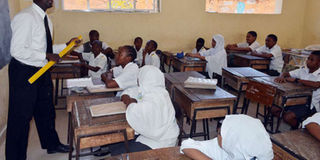New curriculum to focus on learners' skills

Paul Oketch, an English teacher, advises Standard Seven pupils of St Kevin Hills Academy, Mombasa, during class time on September 21, 2015. Parents have been told to play a very active role in the development of their children. PHOTO | KEVIN ODIT | NATION MEDIA GROUP
What you need to know:
- At grades Three and Six levels, an assessment will be carried out to measure pupils’ achievements.
- Dr Jwan said that the implementation of the new system will be undertaken in phases.
Standardised assessment of learners at various levels will be conducted under the new curriculum set to be rolled out starting January 2018.
Kenya Institute of Curriculum Development (KICD) director Julius Jwan said the standardised assessment is meant to gauge the learners’ competence in the subjects they will be taking.
At grades Three and Six levels, an assessment will be carried out to measure pupils’ achievements.
CAREER
This is meant to ensure the learners are achieving the set standards according to their ages.
In Grade Nine, the learners will undergo assessment that will place them on the provided pathways for senior secondary level.
They will choose their career paths at this level.
In Grade 12, the learners will be subjected to assessment for entry into tertiary education based on their selected pathway.
TALENT
Dr Jwan told the Saturday Nation that the new curriculum is aimed at ensuring every learners’ potential is developed both academically and in terms of talent.
Efforts will, therefore, be made to identify and nurture one’s inherent talent.
The director added that the implementation of the new system will be undertaken in phases, starting with the early years of education — pre-primary grades One and Two, and Grade Three.
“Children will start their basic education at the age of four,” Dr Jwan said.
PARENTS
He went on: “While the earlier years are critical in the development of the child, it is important that they are nurtured from the environment they are most familiar with such as the home and later be exposed to more surroundings, including the school.”
Dr Jwan said parents will be required to play a very active role in the development of their children.
“This will ensure the child’s learning is well-supported both at home and school to help them grow into responsible citizens with the right values,” the director said.
EXAMS
The competence-based curriculum puts emphasis on the utilisation of formative assessment as the basis for improvement in learning.
“This will ensure each learner is given the opportunity to achieve the set standards at their own pace based on their ability,” he said.
In education, according to the director, it is recognised that individuals learn in different ways and teachers must understand the learners’ unique needs.
“Emphasis on the learner’s participation in various activities as envisaged in the new curriculum gives prominence to differentiated learning, which will help each learner excel in different ways.”
The Constitution and the Basic Education Act envisage compulsory basic education for learners at the primary and secondary levels.
The new curriculum provides for transition from one level to the other without undue pressure on learners from exams.





